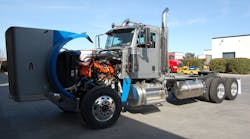Trucking success with natural gas may depend on fuel pricing, RBC says
If the cost of natural gas remains cheap due to the ongoing “boom” in U.S. shale gas production, the trucking industry may very begin favoring it over diesel, according to recent analysis conducted by global bank RBC Capital Markets. However, if natural gas exportation drives up fuels costs, it may slow down any such changeover process, the firm noted.
“This process is in its infancy but is gaining traction,” John Barnes, RBC’s transport and logistics analyst, told Fleet Owner. “There are currently limitations including but not limited to: lack of natural gas distribution at truck stops, lack of a common natural gas technology, i.e. the use of compressed natural gas (CNG) versus liquefied natural gas (LNG); and carriers are looking for commonality of equipment and haven't yet been willing to operate a blended fleet of diesel fueled vehicles beside natural gas fueled vehicles.”
Barnes noted that if the natural gas refueling infrastructure is developed – and efforts are already underway – and the industry decides on a common standard for natural gas powered engines, especially for heavy-duty Class 8 truck purposes, then it is likely to become more prevalent. Yet that also depends heavy on the eventual price for natural gas compared to diesel, he said.
“Fuel has become the trucking industry’s second largest expense behind labor costs and management teams are looking for stability and predictability in fuel costs,” Barnes explained. “However, there is currently a big push to export as much [natural gas] as possible from the U.S., so it is still uncertain what impact the shale discoveries will have on medium- to longer-term fuel prices.”
RBC recently surveyed 357 North American C-suite executives across a variety of industries concerning the impact of the ongoing U.S. “boom” in shale production of both natural gas and oil.
RBC said that 87% of those polled predict natural gas prices will stay the same or increase over the next two years, with 73% anticipating a price increase of 10 per cent or more in the next five years. Until then, those survey participants working in exploration and production (E&P) companies are moving away from dry gas and are focusing instead on “liquid-rich” plays, such as wet gas and shale oil, the firm noted.
Marc Harris, RBC’s co-head of global research added that the shale gas boom is making U.S. companies think twice, with companies in the energy, manufacturing and transportation industries are reassessing underlying market drivers, business models and risks as a result of the shale gas boom. On an economy-wide level, respondents expect that shale gas will improve country competitiveness in both the U.S. (52%) and in Canada (48%).
“We are entering a paradigm shift in the way that businesses and national governments look at energy, particularly as it relates to underlying market drivers, business models, risks and economic impact stemming from the shale gas boom,” he explained. “The coming years will be transformative for companies, particularly those in the energy, infrastructure, manufacturing and transportation sectors, which will, in turn, create opportunities for both investors and corporations.”
RBC’s Barnes noted that in terms of energy consumption patterns, mileage driven is dictated by the strength of the economy and fuel prices, so if natural gas and crude oil extracted from the U.S. shale keeps fuel at a reasonable price point, then consumers will be able to afford to purchase fuel and these purchases at stable prices will leave more money available for discretionary purchases.
“That helps the broader economy,” he stressed. “These [shale gas and oil] finds should decrease U.S. dependence on foreign sources and protect against supply shocks.”
Harris noted that the shale gas boom is impacting industries differently. “Consider manufacturing and transportation: Low cost shale gas will be especially beneficial to companies that rely on feedstock or direct energy usage to compete on a global level,” he explained. “The impact on the transportation industry will be more subtle; rather than a complete transformation to gas-based usage, diversification will likely take place across the industry.”
The critical part of the pricing puzzle, however, depends on the export picture for U.S.-produced natural gas, he said. Indeed, according to RBC’s survey, 54% of those polled said shale gas could lead to natural gas becoming a significant U.S. export in the medium term.
However, revenues generated from natural gas exports will not necessarily have a significant positive impact on the state of the overall U.S. economy, those polled said.



